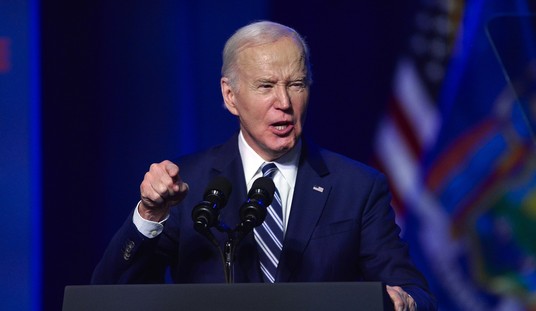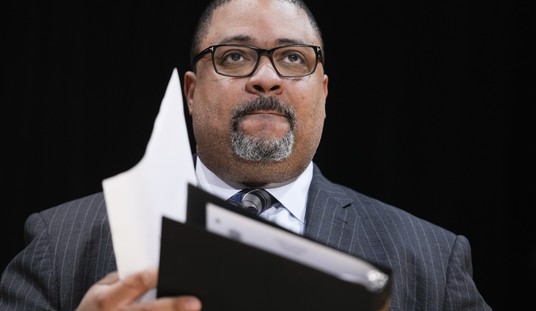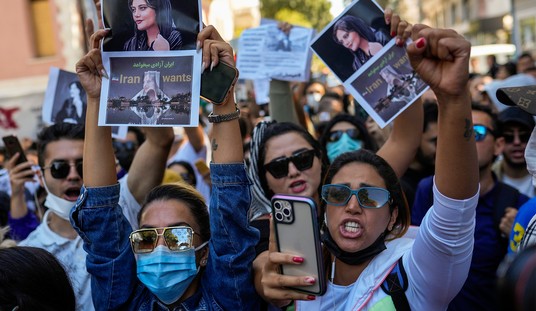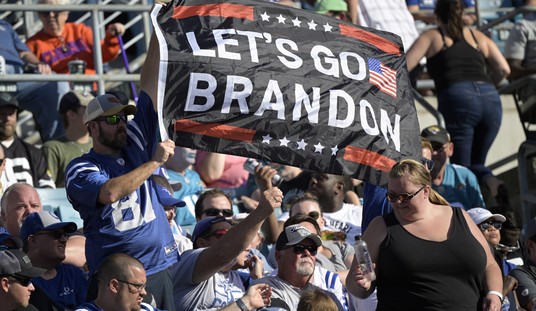The far-left Center for American Progress (CAP) today released a report on the “Islamophobia network” it claims is responsible for the “genesis of anti-Muslim propaganda” in America, which coincidentally began, the report claims, ten years ago (“[S]even foundations over the past decade have helped fan the flames of anti-Muslim hate in America,” writes Faiz Shakir at the CAP’s ThinkProgress blog).
It’s both typically ironic and sadly predictable that CAP lays blame for the instigation of the last decade of skepticism about Islam and its adherents’ aims in the west and around the world at the feet of a Vast Right Wing Conspiracy while almost entirely ignoring another, far more responsible and relevant event that took place ten years ago: the hijacking of four airliners by radical Islamist terrorists and the murdering of 1,629 Americans in New York, Washington, DC, and Pennsylvania. September 11, 2001 is mentioned only twice in the 130 page CAP report, and both times it is entirely in passing (pp. 42 and 75, with both mentions using 9/11 only as a reference point for supposedly extremist commentary by members of the “Islamophobia network” CAP seeks to unmask). Additionally, blame is laid at the feet of this “Islamophobia network” for the actions of Anders Breivik, the Norwegian extremist who murdered nearly seventy people in a bombing and shooting spree in July, while also blaming the “network” for the speculation that abounded while Breivik’s attacks were ongoing that the perpetrator(s) might be Islamist extremists (bear in mind that credit for the attacks was claimed on a jihadi message board while they were ongoing).
That unsubstantiated attacks on Muslims exist is undeniable. Unfortunately, the Center for American Progress’s predictably hyper-partisan “scholarship” and presentation only serves to further exacerbate the extreme rhetoric and factually-challenged talking points that characterize our important national discussion about the nature of Islam, Islamism, and violent jihad, and how it should best be dealt with and, when necessary, combated. An example of the grievances aired by the CAP writers can be seen on pp. 94-95, where the authors take the Middle East Media Research Institute (MEMRI) to task for translating and disseminating the words of international Muslims and Islamists. Such selective outrage, which blames “Islamophobia” on those who translate and publicize what Islamists themselves are saying (within a document that seeks to lay the blame for initiating a decade of Islamic skepticism at the feed of right-wing Westerners), is not only utterly useless in terms of furthering our national discussion of these important issues, but only further widens the divide between the involved parties.
This is unfortunate, because this is an important topic, and one which deserves clear-eyed, fact-based discussion. Even more unfortunate is the fact that efforts like this to execute smear campaigns while avoiding the simplest of facts – like the role of the 9/11 attacks in initiating the last decade of increased skepticism of Islam and Islamism – further add to the Perception Problem that Islam currently faces in the West.
I’ve briefly discussed this Perception Problem before, and though there is limited space with which to address it here, it is a serious problem for both American and international Muslims which (a) should be properly addressed, and (b) is only further exacerbated by hyper-partisan hit jobs like CAP’s divisive, selectively-researched “study.” The core of the Perception Problem is made up of two western views of many Muslims, which are directed in varying ratios depending on the object. These views are (a) most Muslims are at best tacit acceptors (if not supporters) of violent jihadi activities, some of whom are persuadable to violent action against the greater population; and (b) most Muslims support (if they are not actively engaged in) the establishment of Shari’a law in the West.
Neither of these statements is entirely true; further, the perception that first and more serious of the two is (or even that it may be) accurate is significantly reinforced in three ways:
(1) First, and most obviously, is the attempting and carrying out of terrorist attacks by Muslim actors, which was not a new development ten years ago, but which forcefully entered the awareness of Americans who had been willing and able to largely ignore them up to that point. It bears repeating that all terrorists are not Muslims, and all Muslims are not terrorists (far from it in both cases, though particularly in the latter); however, from the 9/11 attacks, to the 7/7/2005 London bombings, to the Sports Drink Suicide bombing attempt, to the Bali bombings, the Times Square bombing attempt, the FedEx printer cartridge bombs, and the 2009 attack on Mumbai, the majority of high-profile terrorist attacks and attempted attacks on the West have been the work of violent jihadis.
Where the attempts and attacks themselves have not caught the attention of the American people, the massive, costly, and intrusive security “enhancements” implemented in their wake have been, from the forced removal of shoes and ban on liquids and gels greater than one ounce at airports in the aftermath of “shoe bomber” Richard Reid and the Sports Drink Suicide plot, to the full-body scans and invasive TSA pat-downs that have escalated in the wake of the failed underwear bombing of Christmas 2009. Each of these has been attempted or carried out by an individual or group conducting violent jihad in the name of Islam, and each of these actions further damages the West’s perception of this religion and its adherents, be they members of the peaceful majority or among the minority of violent actors. The negative impact of these activities on the western perception of Islam and Muslims is exponentially increased when Americans are involved in such attempts and attacks, particularly on American soil. Exhibits A and B of this (of several) are Nidal Hasan, the Army officer who murdered fourteen at Fort Hood in 2009, and Naser Abdo, the private arrested last month for plotting to blow up a Killeen, TX restaurant just months after being heralded by major news media outlets like ABC as a vocal proponent of peaceful, non-violent Islam.
(2) Second, the perceived silence of the significant Muslim population on the subject of violent jihad and Islamist terrorism continues to add to the perception that a far greater percentage of Muslims support terrorism (even tacitly) than actually do. Though inaccurate (and unfair), and though certainly helped along by shrill voices on the right who see creeping Shari’a under their beds at night, this conclusion has been unfortunately and firmly drawn by many western observers. This is partly a result of the celebrations seen around the Islamic world in response to attacks on the West, and partly a result of the virulent and preemptive accusations made by self-appointed defenders of Islam in the aftermath of such actions (see #3 below for more on this). Though neither right nor fair, the reality of the matter that the onus is currently on the Muslim majority that values peace and continued integration into society (to say “coexistence” would portray westerners practicing Islam as outsiders, which in many cases is grossly incorrect) to be vocal in their disavowal of the terrorist activities carried out by those who act in the name of their shared religion. While the vast majority personally oppose such actions, the perception exists – and is widespread – that this majority is unwilling to speak out against those who pervert Islam, which in turn causes the horrific actions of a few to stain a great many through mere association.
(3) Finally, and in my view most importantly at this time, is the preemptively offensive orientation of many of those who claim to represent Muslims or to study “Islamophobia” in the West. Rather than condemning the actions of violent jihadis and distancing themselves and those they represent from people who carry out such attacks in the name of Islam, the response to attempted or successful terrorist attacks by groups like CAIR and other Muslim-interest and left-wing organizations is often to go on the offensive, preemptively accusing Americans of Islamophobia and warning them against associating the action – carried out by Islamists in the name of Islam – with Islam in any way. This is further exacerbated by media reports of such incidents which are laughably absurd in their refusal to acknowledge the Islamic orientation of violent jihadis, and their purported confusion about the motives of those who kill in the name of Islam.
This unwillingness to identify Islamists’ successful and unsuccessful terrorist attacks on western targets with the religion in whose name they are being carried out, combined with Islamic and left-wing groups’ first reactions to terrorist attacks being not a condemnation of the act but a warning to the greater public not to accuse or discriminate against Muslims, has greatly worsened the Perception Problem faced by western adherents to Islam. Efforts like this CAP report to place the blame for Islamic skepticism on a right-wing “Islamophobia network” while refraining almost entirely from mentioning the actions that ignited that skepticism in the first place only widen the chasm between the perception of Muslims and far more benign reality.
Unfortunately, the more that organizations which seek to defend Muslims engage in preemptive and offensive verbal and communication warfare, the more they hurt their cause, as such offensive volleys engender both ill will and increasingly greater pushback. Additionally, the overreaching inherent in such advocates’ effort to disassociate Islam from the actions of Islamist radicals has its own rebound effect, as attempts to protect everyday Muslims through a proactive defense of radicals against religious association or religiously-based criticism, while the insinuation that criticism of, or attacks on, violent jihadis equates to criticism of, or attacks on, all Muslims (and Islam as a whole) only further associates the radical Islamist fringe with everyday Muslims in the minds of the public at large.
The spiral inherent in this system of preemptive strike and further entrenchment is obvious, as should be the damage it causes as both sides further dig in, causing in turn an important conversation and problem to migrate from the domain of rational discourse toward spectral extremes. This situation only makes the Perception Problem faced by western Muslims far greater, and exponentially increases the amount of work which must be done to overcome it, for the good of the vast majority of Muslims who are peaceful members of society, and for our society as a whole.













Join the conversation as a VIP Member